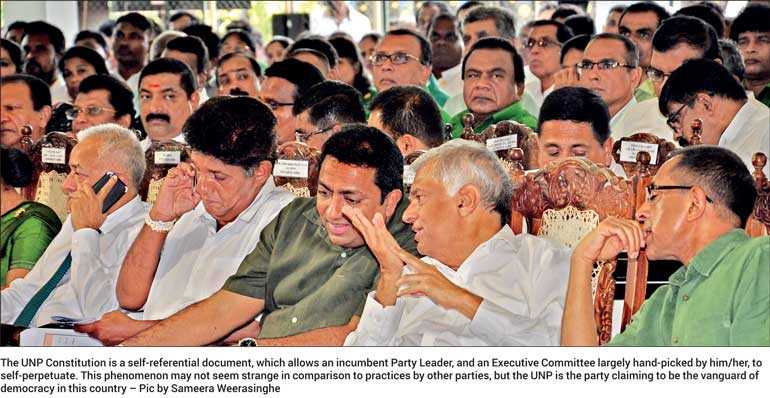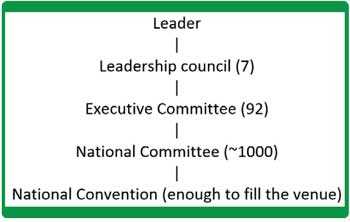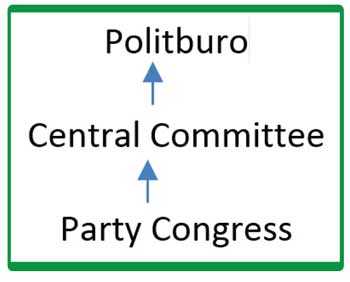Wednesday Feb 25, 2026
Wednesday Feb 25, 2026
Saturday, 7 September 2019 00:10 - - {{hitsCtrl.values.hits}}

 Of the three major parties contesting for the Presidency, JVP and SLPP have already named their candidates. The process of selection is clear - in one, it is a matter for the politburo, and in the other, it is a family matter. In contrast, the UNP’s process is like watching a soap opera with no script.
Of the three major parties contesting for the Presidency, JVP and SLPP have already named their candidates. The process of selection is clear - in one, it is a matter for the politburo, and in the other, it is a family matter. In contrast, the UNP’s process is like watching a soap opera with no script.
The UNP does have a script, or party constitution. Anybody can make a request to the Elections Commission to obtain a copy. I have a copy in my hand. Constitutions of the other major parties are ‘in the mail’, but I thought the UNP document is enough for the moment.
Is there anything in the UNP constitution that will help the party and the country move forward? On the precipice of an election season, this may not be the time to throw the book, at the UNP or by the UNP. Let political forces decide the outcome. However, we can make this moment a learning opportunity – an opportunity to understand and influence our political parties for the future at least.
Most would agree that the UNP constitution is a self-referential document, which allows an incumbent Party Leader, and an Executive Committee largely hand-picked by him/her, to self-perpetuate. This phenomenon may not seem strange in comparison to practices by other parties, or in reference to general feudal tendencies in our culture, but the UNP is the party claiming to be the vanguard of democracy in this country.
We can see several combinations of democracy/ centralism in political parties – from democratic centralism to increasing levels of centralism.
Democratic centralism
Communist parties are typically more structured than most other political parties. If you take the Communist Party of India, the supreme organ of the party is the All-India Party Congress. According to their constitution, the Party Congress must be convened by the Central Committee once every three years. An Extraordinary Party Congress can be called by the Central Committee at its own discretion, or when it is demanded by two or more State Committees representing not less than one-third of the total Party membership. The Party Congress elects the Central Committee. The Central Committee elects a Politburo for the day to day functions of the party.
As the CPI describes, the structure of the party is based on, and its internal life is guided by, the principles of democratic centralism. That means that there is democracy in electing the central authority, but centralism in between these elections. In communist parties, influence of the mobs at the ground level is minimised by restricted admission to membership.
Undemocratic centralism (or self-perpetuating Executive Committees)
The UNP, for example, has the basic elements of a democratic centralist party, but it is designed to be highly centralised. The order of the constituent bodies denotes no more than a hierarchy. The formation of the Central Committee (or Executive Committee in UNP lingo) is a top-down process.
The party convention is open to members of the party. In contrast to Marxist parties, the party membership in a typical political party is open and ad hoc. The party convention, attended by any number of members, has the privilege of nominating 75 members to the Party Congress (or National Committee in the UNP). This is less than 1% of the total membership in the National Committee, which can be more than 1000 members, depending on how many elected MPS, Provincial Councillors, Local Councillors, and representatives from various bodies are included, as per provisions in the constitution or by-laws of the party.
According to the constitution of the UNP, submitted to the Elections Commission in January 2012 (with amendments approved at the party convention of December 2012), the National Committee can make only policy decisions. The Executive Committee is to be elected by a strange procedure, which gives the incumbent Party Leader the ability to hand-pick the Executive Committee.
According to Section 8.3, after the Constitution is approved by the National Committee, the Party Leader will form an interim Executive Committee in consultation with the incumbent Deputy Leader, Chairman, Secretary and Treasurer. It seems that this interim Executive Committee elects the Party Leader, Deputy Leader, Assistant Leader, and National Organiser by consensus, as per section 8.2. If there is no consensus, they will be elected by a secret ballot, where sitting MPS of the UNP are included in the voting body. The Chairman, Secretary and Treasurer are appointed by the Party Leader. Those in these leadership positions, except the Treasurer, comprise the Advisory Council or the Leadership Council. According to Section 8.8, the Leadership Council appoints a maximum of 65 members of the Executive Committee, from among the members of the National Committee, as per defined criteria. Essentially, the interim Executive Committee appoints itself and its friends. The Party Leader has the further privilege of appointing an additional 20 members to the Executive Committee for a total of 92 members. This process gives enormous power to the Party Leader as he/she can hand-pick the interim Executive Committee.
As Hazan and Rahat argue in their book “Democracy within Parties”, intra-party democracy is where one should have not too much or too little, but just the right amount of democracy. If our political parties were to give too much power to the general membership, it will be freedom of the wild ass. Party cohesion and party platform will be subject to whims of mob. On the other hand, giving undue power to the incumbent Party Leader is another extreme.
With a few amendments, the UNP can become a centralised but more democratic party. For example, of the 92 members of Executive Committee, a certain percent, say 75%, should be elected by the National Committee from among its 1000 or more members. This group then elect a Party Leader and the Leadership Council. The Party Leader or the top leadership then can hand pick the other 25%.
Currently the Party Leader of the UNP enjoys a six-year term, giving the Party some stability. This provision was adopted in December 2012. Whether Ranil Wickremesinghe, the Party Leader of the UNP from 1994-2012, and then from 2013-2018, was re-elected to be Party Leader for the next round beginning in 2019, is not clear.
Some light-touch regulation of parties is needed
 The Parliamentary Election Act of 1981 determines the form and function of our political parties. In regulating political parties, it is good to adopt a cautionary approach, because you don’t want an incumbent Government to use the laws to limit the free association of opponents. Therefore, there is generally, we find, a benevolent neglect of intra-party democracy in most countries.
The Parliamentary Election Act of 1981 determines the form and function of our political parties. In regulating political parties, it is good to adopt a cautionary approach, because you don’t want an incumbent Government to use the laws to limit the free association of opponents. Therefore, there is generally, we find, a benevolent neglect of intra-party democracy in most countries.
According to Norris (2004), “One reason for the relative neglect of the internal life of political parties is that these organisations have long been commonly regarded in liberal theory as private associations, which should be entitled to compete freely in the electoral marketplace and govern their own internal structures and processes. Any legal regulation by the state, or any outside intervention by international agencies, was regarded in this view as potentially harmful by either distorting or even suppressing pluralist party competition with a country.” (Norris 2004).
However, there should be some consideration of intra-party democracy. For example, as stated in the Spanish Constitution, Art. 6, “Political parties are the expression of political pluralism; they contribute to the formation and expression of the will of the people and are a fundamental instrument for political participation. Their creation and the exercise of their activities are free in so far as they respect the Constitution and the law. Their internal structure and operation must be democratic.”
 In the Sri Lankan context, at a minimum we should require openness by political parties. Currently, our party constitutions are not readily available. To obtain copies, you need to make a written request to the Elections Commission, wait for permission and collect the copies from the Commission after paying a photocopy fee.
In the Sri Lankan context, at a minimum we should require openness by political parties. Currently, our party constitutions are not readily available. To obtain copies, you need to make a written request to the Elections Commission, wait for permission and collect the copies from the Commission after paying a photocopy fee.
The Elections Commission should require that parties submit PDF copies of their constitutions and post those in the Commission website as soon as they are received. The parties should also be required submit a list of the members of their National Committee and the Executive Committee, respectively, within one month AFTER THE Party convention. Those too should be available in the public domain.
Intra-party democracy is too important to be left to the parties. We should begin by openness and transparency.